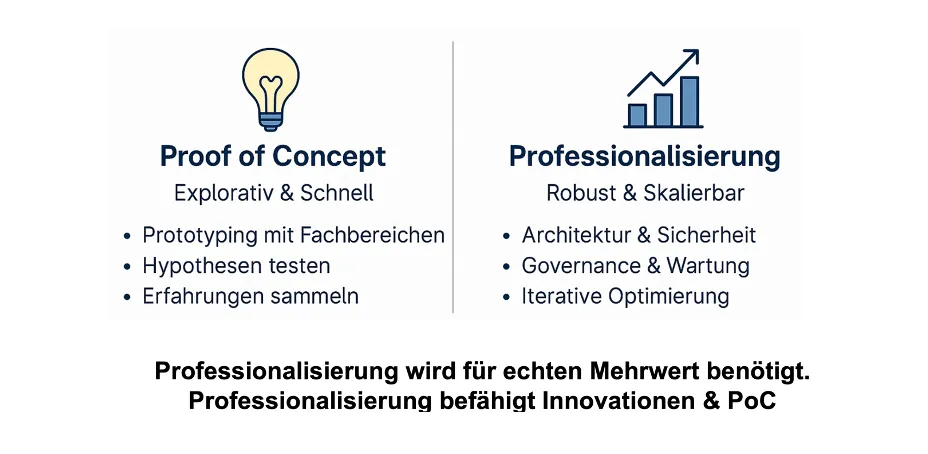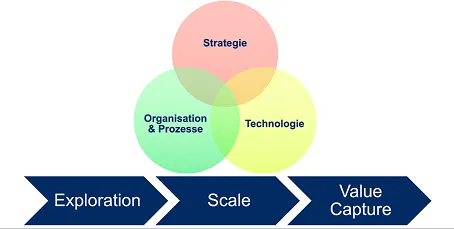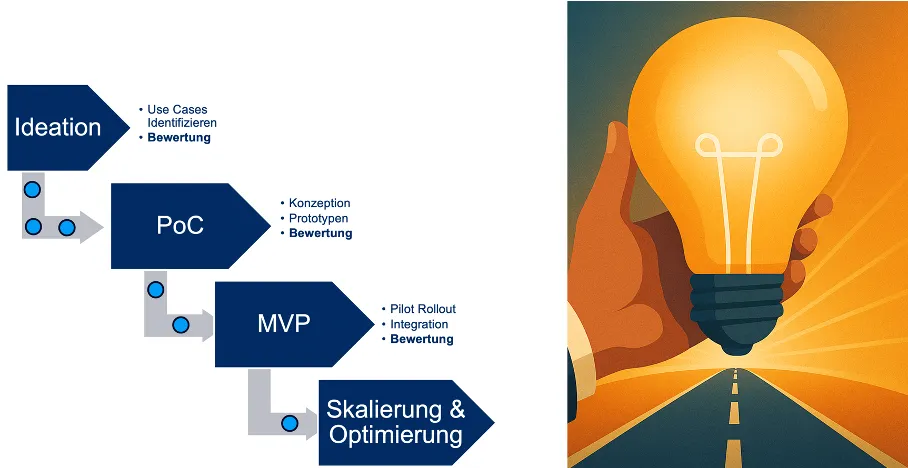.webp)
How Organizations Can Truly Put AI to Productive Use
AI applications, AI workflows, and AI agents are rapidly gaining traction. These systems analyze, plan, and make decisions—often in real time. Many organizations have already implemented their first pilot projects. But if these initiatives are to deliver sustainable value, they must move beyond the experimental stage—fast.
As CTO at AOE, I work closely with companies on this journey. We often begin with a proof of concept and collaboratively evolve promising approaches into production-ready solutions. What I’ve seen time and again: Professionalization is the critical step for long-term success.
What Makes Agentic AI Different
Agentic AI refers to systems that don’t merely respond to prompts—they act autonomously to complete tasks and pursue goals. These agents combine planning, decision-making logic, and contextual awareness with access to external tools, sensors, and data sources. They also engage with users through natural language, whether via chat, voice, or specialized interfaces.
This opens up a wide range of new possibilities—from personal email assistants to intelligent customer service agents that are available around the clock.
Proof of Concept: From “Wow” to Reality

A proof of concept is a great way to bring new ideas to life quickly. We often prototype in hackathon-style sprints, like during our AI Business Innovation Lab event.
But many initiatives get stuck in this early phase. Common pitfalls include ad hoc architectures that aren’t enterprise-ready, unclear responsibilities, or weak security concepts. When it's time to go live, the solution often proves unscalable, hard to maintain, and costly to operate.
Professionalization: The Key to Creating Value

Professionalization means embedding AI systematically into the organization. This includes aligning with business strategy, setting the right organizational conditions, and—on the technology side—building robust architectures, establishing a platform strategy for AI, and putting governance in place.
Only then can companies truly capitalize on the transformative power of AI and put their agents to work productively at scale.
Establishing an AI Innovation Funnel

A well-structured innovation process—from idea workshops to PoCs, MVPs, and full-scale deployment—provides the framework organizations need. Teams can regularly capture and evaluate ideas, identify promising concepts early, and assess effort vs. benefit realistically.
As a lightweight entry point, we offer a free “Quick Ideation” workshop to get started.
What Successful AI Strategies Have in Common
1. Strategic Integration
AI isn’t just another tool—it’s reshaping how we work and think. Strategic integration means consistently asking, “What can we do today, tomorrow, and in the future with AI?” It also means rethinking processes and business models. Ask yourself: What would be possible if every department had its own specialized AI agent—or even a whole team of them?
2. Organization and Culture
The right environment is essential for AI innovation and adoption. An AI Innovation Funnel is a good start, but consider also establishing an AI Excellence Center. This kind of hub supports teams with best practices, training, and shared standards—while still allowing decentralized experimentation. Most importantly, it ensures that people stay connected and learn from one another.
3. Technology with Foresight
Developing and optimizing AI applications requires more than traditional software and architecture skills. You need:
- Modular, flexible architectures for model interchangeability and reusability
- A data architecture with secure, well-documented data flows and interfaces
- Clear process and business domain understanding
Modern AI capabilities such as evaluation-driven development, model discovery, prompt engineering, and context retrieval are now essential skills.
Only with this foundation can organizations build scalable, future-proof AI systems.
Conclusion: From Ideas to Impact
AI offers incredible opportunities. It can increase efficiency, enable new services, and relieve your teams. But to realize this potential, implementation has to be done right. A proof of concept is a good start—but for real impact, companies need more: the right technology, a clear strategy, strong structures, and the courage to explore new paths.
At AOE, we’re here to help with exactly that. Curious about how your organization can benefit from Agentic AI?
Claim the whitepaper!

Kevin Schu
Director Cloud & Devops
Claim the checklist!

Kevin Schu
Director Cloud & Devops
Claim the checklist!

Kevin Schu
Director Cloud & Devops
Claim the checklist!

Stefan Rotsch
Senior Solution Architect, AOE
Claim the checklist!

Stefan Rotsch
Senior Solution Architect, AOE
Claim the whitepaper!

Kevin Schu
Director Cloud & Devops
Claim the checklist!

Kevin Schu
Director Cloud & Devops
Claim the whitepaper!

Kevin Schu
Director Cloud & Devops
Claim the checklist!

Kevin Schu
Director Cloud & Devops

.webp)
.webp)


